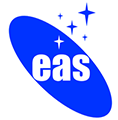German Astronomical Society welcomes new president and board members
During its annual meeting in 2023, the Astronomical Society elected Prof. Dr. Stefanie Walch-Gassner as president, Prof. Dr. Volker Springel as vice president, and Prof. Dr. Julia Tjus as a board member.
"I am delighted to be elected as the first female president in the 160-year history of the German Astronomical Society," said Stefanie Walch-Gassner, who had served as vice president on the board since 2020. "Germany is characterized by cutting-edge research in the field of astrophysics. However, we face challenges such as light pollution and the pursuit of climate-neutral research. As the voice of the AG, I will work to ensure that astronomy and astrophysics are perceived as a cross-disciplinary and public-facing unifying element through discussions on these and other topics. The astronomical diversity in Germany is crucial. It goes hand in hand with the support and education of young scientists. "
Stefanie Walch-Gassner studied physics at Regensburg University and the Ludwig-Maximilians-University Munich. After completing her PhD at Ludwig-Maximilians-University in Munich, she conducted postdoctoral research at Cardiff University, Wales, in the United Kingdom, and at the Max-Planck-Institute for Astrophysics (MPA) in Garching. In 2013, she was appointed as a full professor of theoretical astrophysics at the University of Cologne. As president of the AG, Stefanie Walch-Gassner also assumes the chairmanship of the Council of German Observatories (Rat deutscher Sternwarten, RDS), which is an organ of the AG. She was confirmed as the new chairperson during the RDS's autumn meeting, succeeding Michael Kramer, Director at the Max-Planck-Institute for Radio Astronomy (MPIfR) in Bonn.
The new vice president of the German Astronomical Society is Volker Springel, director at the Max-Planck-Institute for Astrophysics in Garching. Volker Springel studied physics at the University of Tübingen and UC Berkeley, where he completed his diploma thesis at the Max-Planck-Institute for Astrophysics before pursuing his PhD. After a postdoctoral period at the Center for Astrophysics in the USA, he initially returned to the MPA as a postdoc and became a group leader in numerical cosmology in 2005. In 2010, he moved to the University of Heidelberg and the Heidelberg Institute for Theoretical Studies. Since 2018, he has been leading the Department of Computational Astrophysics at the MPA and holds an honorary professorship at Ludwig-Maximilians-University Munich. "As vice president, I want to contribute to the German Astronomical Society, which I have consistently benefited from. I believe that we have an excellent starting position in astronomy in Germany, and there are opportunities to continue to succeed in astronomical research," said Volker Springel.
Julia Tjus, a professor of theoretical physics at Ruhr-University Bochum, was also elected to the board. She completed her PhD in 2007 at TU Dortmund. After a research fellowship at the University of Gothenburg in Sweden, she initially became a junior professor at Ruhr-University Bochum in 2009. She succeeds Jörn Wilms of the Dr. Karl Remeis Observatory, the Astronomical Institute of the University of Erlangen-Nuremberg. Jörn Wilms will continue to support the AG board in the preparation of the next memorandum of astrophysics in Germany.
Prof. Thomas W. Kraupe planetarium expert and former director of the Hamburg Planetarium (Treasurer), Dr. Klaus Reinsch of the University of Göttingen (Secretary), Dr. Janine Fohlmeister of the Leibniz Institute for Astrophysics Potsdam (Public Relations Officer), and Prof. Dr. Olaf Kretzer of the Schul- und Volkssternwarte Suhl (Counselor) complete the board of the Astronomical Society. Steven Hämmerich of the Dr. Karl Remeis Observatory, the Astronomical Institute of the University of Erlangen-Nuremberg, heads the office of the German Astronomical Society.
Founded in 1863, the German Astronomical Society (Astronomische Gesellschaft, or AG for short) is the professional association for German astronomy and astrophysics. The AG promotes activities in science and research, fosters communication among its members, communicates science to the public, and supports education. At the international level, the AG represents the common interests of astronomers in the European Astronomical Society (EAS) and the International Astronomical Union (IAU). The Council of German Observatories (RDS), as an organ of the Astronomical Society, represents the shared interests of German research institutes involved in astronomical research to funding agencies, state and federal authorities, international organizations, and other domestic and foreign bodies.
Prof. Dr. Stefanie Walch-Gassner
President German Astronomical Society
president@astronomische-gesellschaft.de
Dr. Janine Fohlmeister
Press officer German Astronomical Society
pressofficer@astronomische-gesellschaft.de




